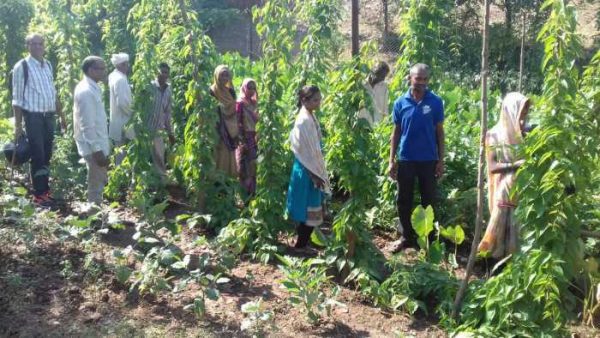Farmers earned an additional income of Rs. 5.88 Lakh even during lockdown period of April-May 2020. Farmers produce 1,03,580 Kgs of vegetables and sold 70,350 Kgs by now.

At the time when Coronavirus has severely impacted the livelihood of millions of farmers across the country, 100 farmers in Surata Gram Panchayat of the district Dungarpur, in Rajasthan, are celebrating their bumper produce of about 1,03,580 Kgs of vegetables, out of which 70,350 Kgs have been sold to generate an additional income of around Rs. 25.38 Lakh till now.
Under the aegis of ‘PAHAL’ (Promotion of Agricultural and Horticulture for Advancement of Livelihoods), a pioneering social project by the DS Group, 100 farmers were helped and trained for “WADI” development. ‘PAHAL’ encourage
WADI promotes water efficiency for farming as a tool to improve agriculture and food security for small & marginalised farmers. The objective is to introduce profitable vegetable cultivation to meet the local demand and simultaneously generate additional income for the farmers and secure their livelihood. This also helps in resolving the issue of malnutrition and many other social and economic issues for these poor tribal families and enhances green cover of the area. Livelihood improvement is one of the key focus areas of Corporate Social Responsibility by the DS Group.
Even during the crucial Covid-19 lockdown period of April and May 2020, when the country was trying to deal with scarcity of essentials, the farmers of Dungarpur produced around 24,580 kgs of vegetables and have already sold more than 17,050 Kgs. This generated an additional income of Rs.5.88 Lakhs for them. Surata earlier was dependent on vegetables supply from Modasa, Gujarat. Now around 60% to 70% of vegetables need is met locally due to ‘PAHAL’ and the vegetables are farm fresh .
“No one wants to leave the family and search for work in neighbouring States. But we had no choice. I have to feed my children, my family. But once I enrolled for PAHAL project, my life has changed. I am able to earn substantial additional income, which has improved my living conditions. My children now go to school regularly and I am able to provide them with good food. My future is secure”, says Kanti Lal, a ‘PAHAL’ farmer.
Pari of village Dol Kunjela is happy that her husband is staying with family now and also earning good money. ‘PAHAL’ by DS Group has kept my family together. My husband used to go to Gujarat for 4 months in a year to work as a daily wage labourer, now, we all are staying together and we have a secure livelihood, with an additional income too”, she says.
The DS Group has also helped the beneficiaries by linking them with Government schemes like Sukanaya Samriddhi Yojana, Pradhan Mantri Ujjwala Yojana, Pradhan Mantri Matru Vandana Yojana (PMMVY), Pradhan Mantri Suraksha Bima Yojana, Rajasthan Social Security Pension Scheme and Rajshree Yojna.
So far, 100 farmers have enrolled in ‘PAHAL’ and another 200 tribal farmers residing in Surata and nearby gram panchayats are in the process of being enrolled. The DS Group project team has a well set selection process of farmers that includes availability of water for the irrigation, suitable land for the Wadi, past track record of farm practices, interest for diversified agricultural based interventions and willingness to sell vegetable.
Dharampal Satyapal Foundation is working in Surata Gram Panchayat, in Dungarpur, since 2015. The Foundation has worked towards identification of villages, selection of farmers, setting up of WADI, capacity building of the farmers, crop production and market linkages.
Dungarpur is a small arid district in Rajasthan with low land productivity. In Surata and nearby gram panchayats, majority of community members are tribal and their main source of livelihood is agriculture or working as daily wage labourers.